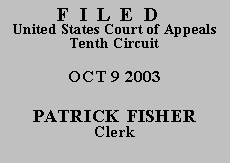

| UNITED STATES OF AMERICA, |
|
ORDER AND JUDGMENT(*)
Before EBEL, LUCERO, and O'BRIEN, Circuit Judges.
After examining the briefs and appellate record, this panel has determined
unanimously that oral argument would not materially assist the determination of
this appeal. See Fed. R. App. P. 34(a)(2); 10th Cir. R. 34.1(G). The case is
therefore ordered submitted without oral argument.
Defendant-Appellant Cesar Antillon-Gutierrez pled guilty to one count of
illegal reentry by an alien deported following a conviction of an aggravated
felony, a violation of 8 U.S.C. § 1326(a). He was sentenced to forty-six months
imprisonment, two years supervised release, and a special assessment of $100.00,
but was spared a fine. Ignoring his written waiver, he now appeals his sentence,
asserting the district court inappropriately interpreted the United States
Sentencing Guidelines by enhancing his criminal history score from Category II
to Category III. This court lacks jurisdiction to consider his appeal. See United
States v. Rubio, 231 F.3d 709, 711 (10th Cir. 2000) (reasoning that where
"Defendant's waiver is effective, we would certainly overreach our jurisdiction to
entertain this appeal when the plea agreement deprived Defendant of the right to
appeal.")
On April 8, 2002, Mr. Antillon-Gutierrez signed a written plea agreement
which reads in part, "by entering into this agreement the defendant and the
United States both waive the right to appeal any legal sentence imposed by the
Court within the applicable guideline range as determined by the Court; both
parties reserve the right to appeal either an illegal sentence or a departure." (R.
on Appeal at Tab 12, Plea Agreement, ¶ 5.) To be sure Mr.
Antillon-Gutierrez
understood the terms of the plea agreement, the government reiterated those
terms during the change of plea hearing, emphasizing that Mr. Antillon-Gutierrez
had agreed to waive his right to appeal the sentence ultimately imposed absent
illegality or departure. (Supp. R. on Appeal at p. 13.) When asked by the
district
court, Mr. Antillon-Gutierrez acknowledged he had the same understanding.
(Id.)
In an articulate decision announced from the bench, the district court ruled that Mr. Antillon-Gutierrez's circumstances deserved a Category III criminal history score, as recommended in the pre-sentence investigation report, instead of Category II, as proposed by the defense. Mr. Antillon-Gutierrez objected to the decision when announced and now attempts to appeal from it, arguing that a Category III determination resulted in an "illegal sentence." Mr. Antillon-Gutierrez does not question the validity of the plea agreement, and there is nothing in the record to suggest his decision to waive his right to appeal was anything less than knowing and voluntary. Nor does he suggest the district court departed from the sentencing guidelines. Instead, ignoring that the sentence was, as the plea agreement contemplated, "within the applicable guideline range as determined by the Court," he claims the sentence is somehow illegal because the district court arrived at a higher criminal history category than authorized. (R. on Appeal at Tab 12, Plea Agreement, ¶ 5) (emphasis added).
Mr. Antillon-Gutierrez's argument defies precedent. It is well settled that a defendant's knowing and voluntary waiver of his statutory right to appeal a legal sentence will generally be enforced. United States v. Black, 201 F.3d 1296, 1300 (10th Cir. 2000). Exceptions are rare, but may be made under certain circumstances; for instance, where the district court relies on an impermissible factor such as race, where the sentence exceeds the statutory maximum, where the waiver is alleged to be invalid as a result of ineffective counsel, or where the waiver is otherwise unlawful. Id. at 1301; United States v. Elliot, 264 F.3d 1171, 1173 (10th Cir. 2001); See also United States v. Neary, 183 F.3d 1196, 1198 (10th Cir. 1999) (defining facially illegal sentences as those sentences based on race, gender, or other considerations contravening clearly established public policy). We have further defined an "illegal sentence" as one which is "'ambiguous with respect to the time and manner in which it is to be served, is internally contradictory, omits a term required to be imposed by statute, is uncertain as to the substance of the sentence, or is a sentence which the judgment of conviction did not authorize.'" United States v. Dougherty, 106 F.3d 1514, 1515 (10th Cir. 1997) (quoting United States v. Wainwright, 938 F.2d 1096, 1098 (10th Cir. 1991)).
Mr. Antillon-Gutierrez's argument that an error in determining criminal history amounts to an illegal sentence is a stretch. He has directed us to no authority for that proposition and our research has revealed none. Even if erroneous (highly unlikely on this record), the district court's criminal history determinations would not bring the resulting sentence within the narrow definition of an illegal sentence. Aware that there is no accusation of departure, and having reviewed the entire record on appeal, especially the plea agreement and sentencing transcript, we find no illegality in the sentence imposed.
Mr. Antillon-Gutierrez waived his right to bring this appeal, and it is dismissed for lack of jurisdiction.
Entered by the Court:
TERRENCE L. O'BRIEN
United States Circuit Judge
*. This order and judgment is not binding precedent except under the doctrines of law of the case, res judicata and collateral estoppel. The court generally disfavors the citation of orders and judgments; nevertheless, an order and judgment may be cited under the terms and conditions of 10th Cir. R. 36.3.